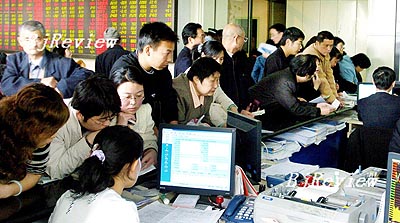
At present, trading stocks has become the hottest topic in China. People are talking about the stock market everywhere and at any time. It almost seems as if everyone in the country has become an instant stock trader overnight.
According to statistics from China Securities Depository and Clearing Corp. Ltd., by the end of August 22, the total number of securities accounts registered in Shenzhen and Shanghai stock markets had reached 115 million. This means that one out of every 11 people in China is trading stocks.
Trading stocks is nothing new in other countries, but in China it's all the rage.
"In matured securities markets, the proportion of stock traders to the population far outpaces that of China," said Zheng Zhi, securities analyst with Guotai Jun'an Securities. According to Zheng, individual stock traders in the United States account for 25 percent of the whole population, and in Britain, the ratio is around 23 percent. But Zheng pointed out that in spite of the bigger proportions, few of these individual investors trade stocks on their own. "Over 90 percent of individual investors abroad trade stocks through investment institutions or fund management companies," Zheng noted. "In China, however, institutional investors only account for 24 percent of total traders in the domestic stock market."
Zheng said many of the newly registered individual investors know little about the stock market and therefore trade blindly. Moreover, those people tend to chase after stocks whose prices grow the fastest and some pry into so-called inside information, which adds more investment risk.
However, such blindness has also brought some individual investors much in return. At the end of last year, 26-year-old Li Kai started to buy and sell stocks. Before venturing into the murky market, he had little financial knowledge. The reason Li opened a stock account was that many of his friends had made enormous amounts of money by trading stocks. "Why can't I?" Li asked himself.
"So far, my assets have surpassed 70,000 yuan from the original investment of 40,000 yuan," Li said with satisfaction. Yet he also admitted that he still knew little about the stock market and most of the time he traded stocks according to tips from friends.
Li is lucky among individual investors. According to Wanguo, a stock evaluation company, more than 40 percent of stock investors suffer paper losses, including 70 percent of newly registered investors. Even with such bad news, success stories like Li Kai's have encouraged more people to jump on the stock bandwagon.
City dwellers are leading the surge. The central bank's second quarter survey of urban depositors showed "investments in securities surpassed deposits in banks" as the most favored investment tool, indicating a new investment era for Chinese citizens. For Chinese individual investors, this new era could be "the best of times, and the worst of times."
Being Warren Buffett
The successful individual investor prototype for many people is Warren Buffett-the "God of the stock market"-who has presented a blueprint for individual investors longing to make a fortune on the stock market.
Lin Yuan, hailed as the "Chinese Buffett," is now a household name. About 16 years ago, Lin opened an account in the stock market with 8,000 yuan. Over the years Lin has experienced ups and downs in the stock market but has managed an annual return of more than 98 percent. The original 8,000 yuan has been turned into 2 billion yuan. At present, Lin said, he has mortgaged his house and put all his money in the stock market, which he believes will continue to be bullish.
According the latest survey conducted by the Securities Investor Protection Funds Corp. (SIPFC), individual investors with assets under 100,000 yuan accounted for 25 percent of all respondents, while those with assets under 500,000 yuan took up 70 percent. More noticeably, about 70 percent of individual investors had invested at least one third of their family assets into the stock market.
Lu Xing, an analyst from China Merchants Securities, said from an ordinary investor's point of view that it is less risky if one invests 10 percent of one's assets in the stock market and that a stock investor may face a moderate level of risks if the rate rises to 20 percent. Any proportion over 30 percent, however, is highly risky, he warned. Encountering a market slump, these high-risk investors could suffer enormously both mentally and economically.
| 